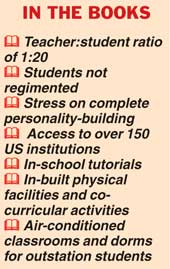 |
Science classes in the lab and not in the classroom. A visit to the stock exchange to track scrip movement. Dropping in at a software technology park for mastering megabytes, stopping by the studio of an artist to get close to a canvas. No uniform, just a dress code. French lessons in school. And, generally, having fun while you learn.
For 32 years, the Calcutta International School (CIS) has provided parents in town the one real option of breaking the mould and allowing their wards to pursue ‘O’ and ‘A’ level degrees, affiliated to a UK university. Now, there is a bigger alternative in sight.
For students who don’t want to stay fettered to “dated concepts, antiquated syllabi and unscientific teaching techniques”, The Cambridge School (TCS), the first in Calcutta affiliated to the University of Cambridge, opens its doors next month.
Registered with the Cambridge International Examinations, Local Examinations Syndicate, the school is located close to the Jatin Das Park Metro station. TCS offers ‘O’ and ‘A’ level degrees from Classes VIII to XII. The sessions begin on June 16.
Admission to Classes IX and XI science stream is almost full, with enquiries coming in even from the Northeast. “A dipstick study we did in the city showed a significant level of disenchantment with the present system characterised by memorisation, regurgitation and private tuition. People are willing to switch their wards to the ‘A’ level if the system is transparent,” says managing trustee Sarojesh C. Mukerjee.
“The goal of this rather unique school is not just to impart a world-ready, useful education, but also an enjoyable one. We don’t want to thrust anything upon the students that would create an antipathy towards education,” he adds.
Course materials and question papers will be sourced from Cambridge University through The British Council, Calcutta, which will conduct the examinations. Answer-scripts will be sent to the UK university for marking.
“We are, by design, a small school with small class sizes so that students are not just anonymous faces, but get individual help and attention,” stresses principal-designate Nonda Chatterjee. TCS plans to restrict student population to a maximum of 200 eventually, with a teacher-student ration of 1:20.
In Classes IX and X, the only compulsory subjects are English language and maths, while students are free to pick only five from 11 subjects. In Class XI, students need take up only three subjects, as opposed to five or six in other systems.
The school is not all study. “We also offer courses in French, English writing, journalism, besides access to a gymnasium, music appreciation and learning classes, etc,” says Mukerjee, who donated the 10,000-sq-ft school building as start-up capital, and has got on board accomplished professionals of diverse profiles to “spend quality time with the students”.










